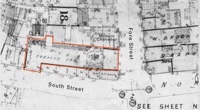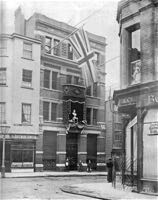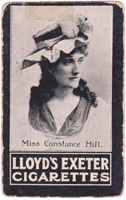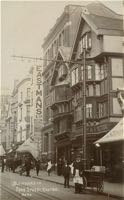
H C Lloyd & Son., tobacco manufacturers, Fore Street
Latest update 8th May 2016
Return to Industrial Exeter
Exeter is best remembered for its woollen industry, and to a lesser extent, its iron foundries. However, there was one industry in the heart of the city that at one time employed as many as 180, of which there were many women—Lloyds Tobacco Co. The company existed for 140 years, mostly in premises at the top of Fore Street, and was said to be a favourite supplier of tobacco products in the south-west.
One of the founders of the General Bank in Fore Street, in 1792, was Robert Cross. Hailing from Bristol, he married Martha Pearson in 1771, and their son Henry Cross, was born in Exeter in September 1776. The first time that Henry appears in the Exeter newspapers, when he was 25, that I have found, was during June 1801 when he was before the Commission of Bankruptcy at the Globe Tavern for the payment of the final dividend to his creditors. From this we can deduce that he had been trading before his bankruptcy, as a tobacconist—how long he had been trading is not clear. Cross lived in the parish of St John, where he was listed as a member of the militia in 1803.
In 1804, Cross was again trading tobacco products, this time an ‘improved tobacco water’ to treat “scab in sheep, and insects in all animals”. If he was starting again, selling to farmers rather than smokers, was perhaps because he was seeking customers who did not know about his previous bankruptcy. During the next year he procured some Maryland tobacco which could not even be purchased in London, and which he advertised for the smoking clientele.
Henry's eldest son, Henry was born in October 1805, and would go on to continue running the tobacco business.
Business must have thrived for by 1820 Henry Cross was treasurer for the Devon County Club which existed to promote the British Constitution and civil and religious liberty, leaving the memory of his bankruptcy far behind him. Henry Cross, died in May 1825 at the age of 49, leaving his son, also Henry, to continue the business.
The 1828 directory for Exeter gives 77 Fore Street as the address for his salters and tobacconists business. Henry Cross continued to sell tobacco products until 1843, when Lloyds Tobacco of London acquired the Exeter business.
Becoming Lloyds
Hailing from a formerly well off Welsh family, Richard Lloyd, set out as a manufacturer of tobacco products in Holborn, London during 1784. At that time, the main uses of tobacco was for pipe smoking and snuff. Claims were made for its medicinal use, as well as pleasure, and the habit of using tobacco products in the coffee houses of the day spread through the country. In 1843 Lloyds acquired Henry Cross and Co., of Exeter, who were listed in Robson’s Directory of 1839 as “Cross Hy. & Co. Tobacco and snuff manufacturers, and tea dealers, 77 Fore st”.
By 1851, business was in the hands of the founders grandson, Richard Lloyd. The census shows the 27 year old Richard G Lloyd, tobacconist, as head of the family living at 76/77 Fore Street with two brothers and two sister. His brother Edward is also listed as a tobacconist.
Eventually Richard’s sons, Horace Charles and Robert Lloyd took over the reins of the business. Horace Charles died relatively early, leaving Robert to run the business on his own. The local manufacturers of snuff Messrs. Nation were incorporated into the business’ In the 1870s. The premises were extended in 1881, by taking over a furniture bazaar in South Street that was adjacent to the Fore Street building, creating a long L shaped site. The cigarette machinery was moved into the new space. South Street became a goods entrance, while there was a small entrance from George Street.
Up to June 1886, the London and Exeter company was known as Richard Lloyd and Sons, when the Exeter business was taken over by Horace Lloyd, becoming H C Lloyd and Son. Horace’s son Fred Lloyd suffered ill health, so Robert’s son-in-law, Robert Gracey became manager in 1889. Robert Gracey lived in Exwick House, the old mill house for the Exwick Steam Laundry. Soon after, Gracey eventually became a partner in the firm, before his father-in-laws death in 1893, when he took control of the whole enterprise. He decided to modernise, installing a Baron cigarette machine. Patented in 1896, the machine could turn out 450 cigarettes a minute. Lloyd's cigarette and tobacco brands included Tipsy Loo, Silver Fir, Lid Lals, Tinners Pipe Tobacco, Prince Llewelyn Tre, Pol, Pen 100 A1, Cherry Ripe and Topsham Mixture.
The company, along with many of its rivals, also produced ranges of cigarette cards to encourage brand loyalty. Subjects included famous generals, and a set of portraits of some of the female workers dressed in various costumes.
During the Boer War, in February 1900, the Exeter Master Bakers sent 100b of “Broad R” and “Topsham Mixture” from Lloyds to the 1st Devon Regiment at Ladysmith. Lloyds also presented every Devon Reservist a quarter pound tin of tobacco when they were inspected at Higher Barracks.
By 1909, Robert Gracey was suffering from ill health and wished to retire from the business. The business was sold to new management in 1909, when a new company was formed with a capital of £40,000. Shares were offered in the new company, including £15,000 worth of £1 ordinary shares.
During the First War, they shipped tobacco products out to the troops, often paid from funds raised by the Mayoress of Exeter's Depot.
In 1921 the business went into voluntary liquidation. Some attribute its failure with supplying free tobacco products to the troops at the front during the war. The premises plus the bonded store at 22, Coombe Street, where auctioned at the Rougemont Hotel in June 1923 and sold for £8,500 to Hellier, Parker and Bowden for a client, who turned out to be Woolworths, who were to open their first store in Exeter. The upper floors were leased to a North of England syndicate who were to open a billiard hall. The plant and equipment was sold in the August—the 600 lots included cigarette making machines, and tobacco testing equipment. In 1924 Cope Brothers acquired the goodwill and other assets of Lloyds Tobacco of Exeter—they would eventually become part of Gallahers.
The production of tobacco products in Exeter came to and end with the closure of Lloyds, but retailing continued, with McGaheys Tobacconists the most prominent. They are still trading on the corner of Castle and High Street.
Source: Genuki, British Newspaper Archive, and census records.
│ Top of Page │



